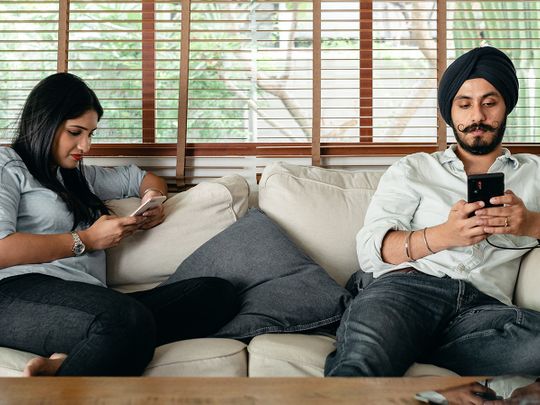
Have you ever gone to a restaurant with your partner, or out with your friend, and found them glued to their phone? It’s a common occurrence, and one that’s leaving behind a trail of resentment.
Click start to play today’s Crossword, where you might react to phubbing by using the phrase mentioned in 4-Down.
Phubbing is the act of prioritising your smartphone over real-life social interactions. Even though everyone has a phone (or two) nowadays, phubbing is considered to be a social faux pas – an undesirable behaviour that seemingly persists even when we try our best not to do it.
According to a January 2016 study published in the journal Computers in Human Behaviour, phubbing was found to be associated with lower relationship satisfaction. It led to conflicts with partners over smartphone usage, and individuals with anxious attachment styles reported higher levels of conflict than others.
In another study, published in December 2022 in the journal Computers in Human Behaviour, researchers found that phubbing ‘victims’ usually responded to the behaviour in three ways: they felt more resentment towards their partner, they experienced greater curiosity about their partner’s phone use, or they retaliated by engaging in their own phone use.
So, even if you don’t want to use your phone while waiting for your food at a restaurant, you might just phub right back, if you notice your partner doing it.
The study took a closer look at retaliative phubbing and found predictive behaviours for the practice:
1. Boredom
If your partner is on the phone, and you have no one else to talk to, boredom is a natural response in such a situation. It’s a strong motivator for retaliative phubbing.
2. Wanting revenge
In some cases, the more phubbing a partner receives, the more they feel a desire for revenge. It’s why they pick up the phone and begin to ignore their partner, in an effort to overcome the feeling of being slighted or offended.
3. Wanting support
The frustrating experience of being phubbed can make people look for support elsewhere. They might chat with another person on their phone, since their partner is ignoring them for the moment.
4. Wanting approval
The sting of being rejected for a smartphone can motivate people to turn to others for approval. They might try to look for the love and assurance they miss from their partner, in other people on their contact list.
Even the healthiest relationships can have partners busy on their phones at the same time, but it’s well worth noting that phubbing does not contribute to the wellbeing of relationships in the least. Even joint phubbing – as momentarily satisfying as it is – represents a lost opportunity.
Are you or your partner guilty of phubbing? Play today’s Crossword and tell us at games@gulfnews.com.







